The Importance of Forgiveness in Addiction Recovery

Understanding the Power of Forgiveness in Healing
Forgiveness is a cornerstone of recovery from addiction, playing a vital role in healing emotional wounds, reducing mental health struggles, and fostering long-term sobriety. It serves as a transformative process that enables individuals to let go of resentment, shame, and guilt—emotions that can impede progress and trigger relapse. This article explores the significance of forgiveness, both self-directed and towards others, illustrating how integrating forgiveness into recovery strategies can promote emotional stability, relationship repair, and enduring wellness.
The Role and Importance of Forgiveness in Addiction Recovery
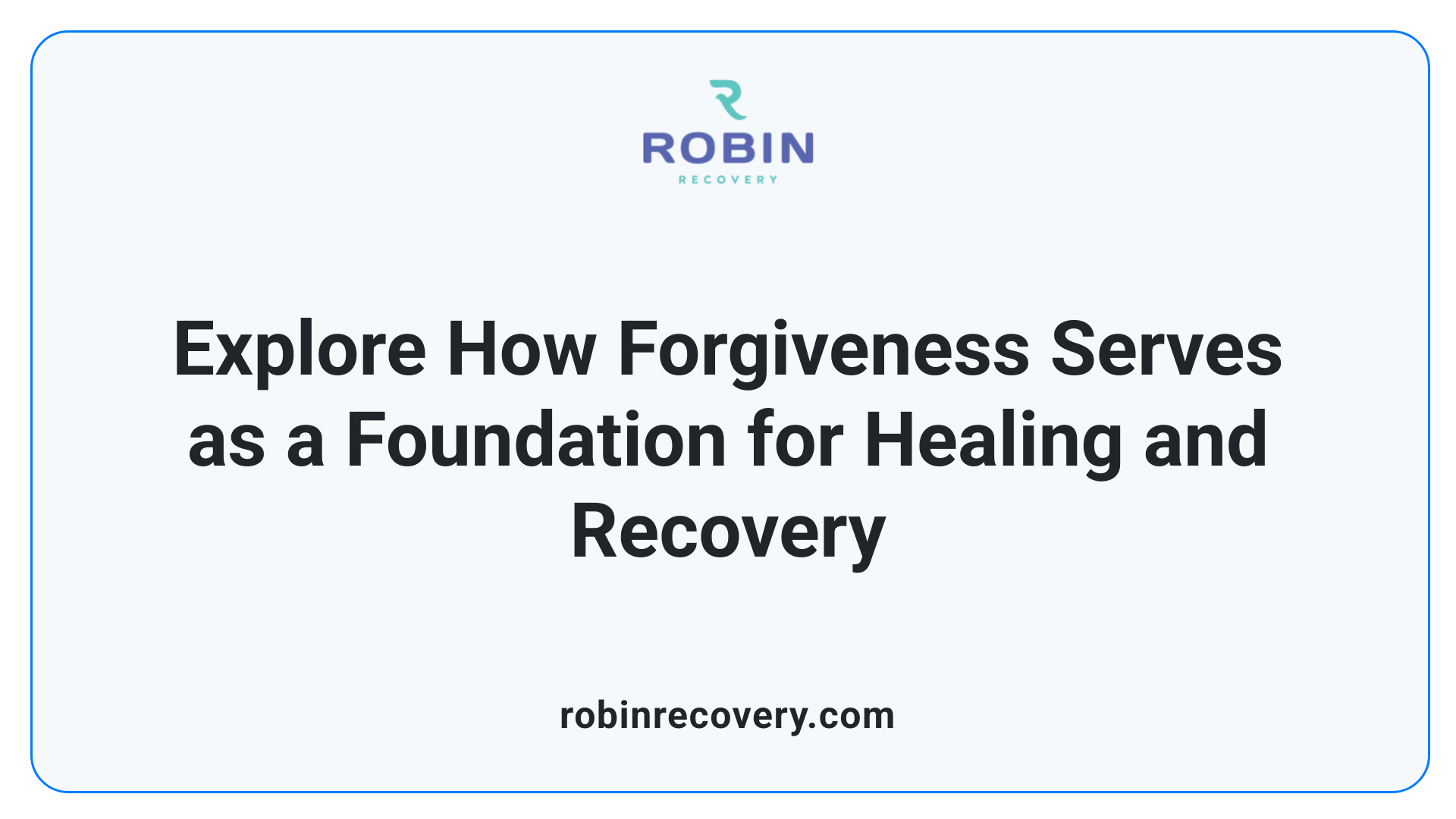
What is the role and importance of forgiveness in addiction recovery?
Forgiveness is a cornerstone in the journey of addiction recovery. It serves as a powerful tool for emotional healing by helping individuals let go of negative feelings such as resentment, anger, guilt, and shame. These emotions can create barriers to recovery, trapping individuals in cycles of self-blame and regret.
By practicing forgiveness, individuals are empowered to release past hurts, which fosters self-compassion and resilience. This process not only aids in healing emotional wounds but also rebuilds trust in oneself and others, especially after strained relationships caused by addiction.
Self-forgiveness, in particular, plays a crucial role. It involves acknowledging mistakes without condemning oneself, allowing for mental and emotional renewal. Techniques like writing unsent letters, making amends, and seeking therapy support this journey.
Moreover, forgiveness benefits physical health. Research shows it can lower stress levels, reduce blood pressure, improve sleep, and decrease symptoms associated with stress and depression.
Spiritual growth and inner peace are often cultivated through forgiveness, providing a sense of purpose that encourages long-term sobriety. As individuals embrace forgiveness, they develop a healthier outlook on life, moving forward with hope and a positive mindset.
In summary, integrating forgiveness into addiction recovery creates a fertile ground for healing, relationship restoration, and sustained recovery success. It is more than just a moral virtue—it is a vital component that supports resilience, mental health, and emotional stability, making the path to sobriety less burdensome and more sustainable.
The Psychological and Physical Benefits of Forgiveness During Recovery
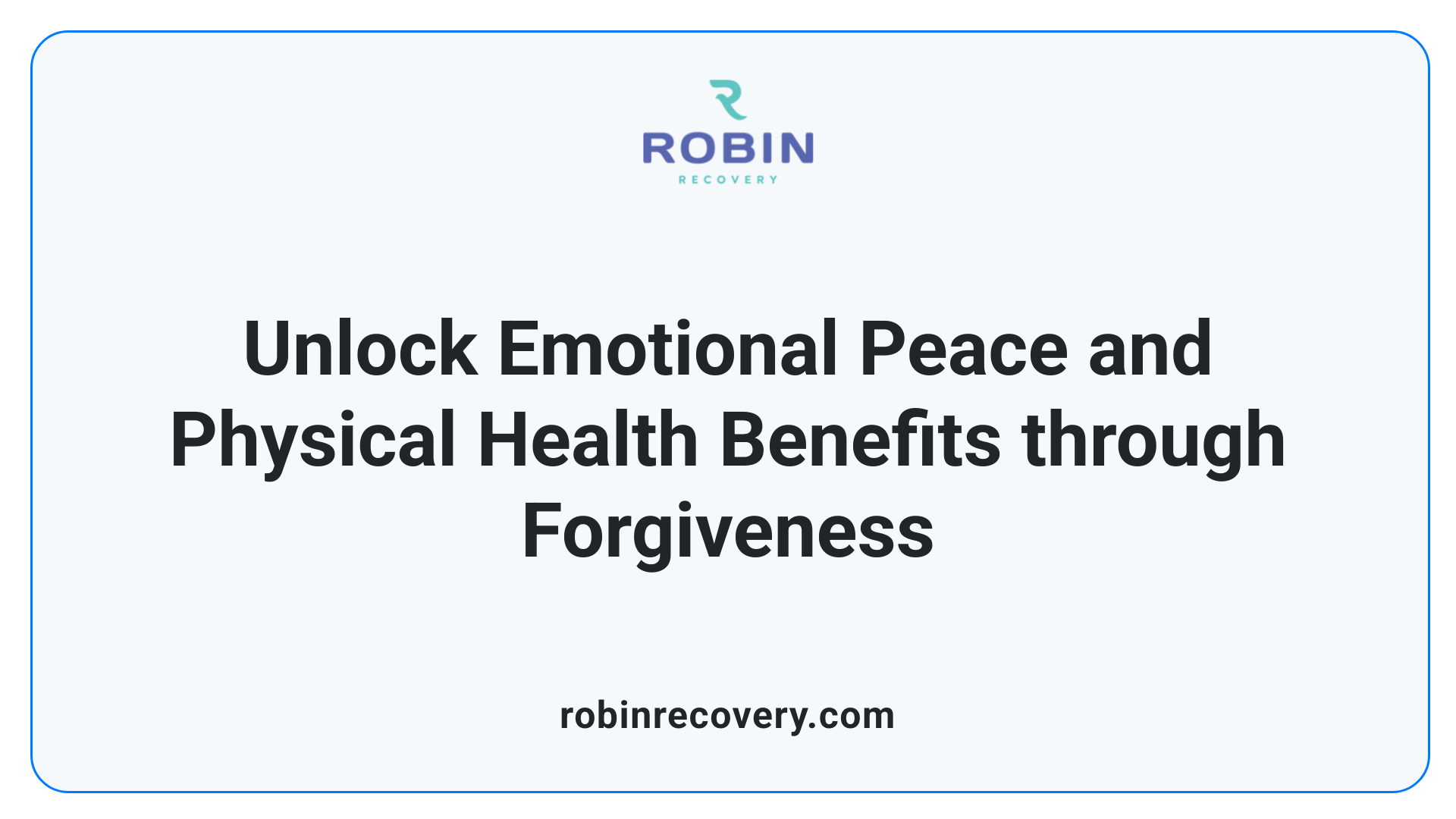
How does forgiveness impact emotional and mental health during recovery?
Forgiveness plays a vital role in improving emotional and mental well-being during recovery. It helps individuals let go of persistent negative feelings such as anger, resentment, and bitterness, which can create emotional distress and slow healing. By practicing forgiveness, people foster emotional healing, increase self-awareness, and develop self-compassion.
This process of forgiving oneself and others reduces stress, anxiety, and symptoms of depression. It encourages inner peace, spiritual growth, and a positive outlook, all crucial for sustaining recovery. Embracing forgiveness allows individuals to move past past hurts, build resilience, and improve self-esteem. Overall, it creates a stable mental foundation that promotes healthier relationships and emotional balance.
The path to forgiveness nurtures a more peaceful mind and supports the development of a positive mindset essential for long-term sobriety. It shifts focus from past regrets to present growth, enabling individuals to recover emotionally and mentally.
What are the physical health benefits linked to forgiveness?
Scientific research highlights numerous physical health benefits associated with forgiveness. Psychologist Michael McCullough's studies reveal that forgiving others can lead to measurable improvements in physical health indicators, including lower blood pressure and reduced heart rate.
Forgiveness also significantly decreases the levels of cortisol, a hormone released during stress, which, when elevated, can contribute to a range of health issues such as heart disease and immune suppression.
Additionally, engaging in forgiveness enhances sleep quality by calming the nervous system and reducing arousal caused by resentment or anger. The reduction in physical symptoms of stress supports overall emotional health and can prevent chronic health conditions.
By releasing anger and resentment, individuals free their bodies from sustained physical tension, thus fostering better health outcomes and contributing to a more robust recovery process.
Self-forgiveness: A Pillar of Healing in Addiction
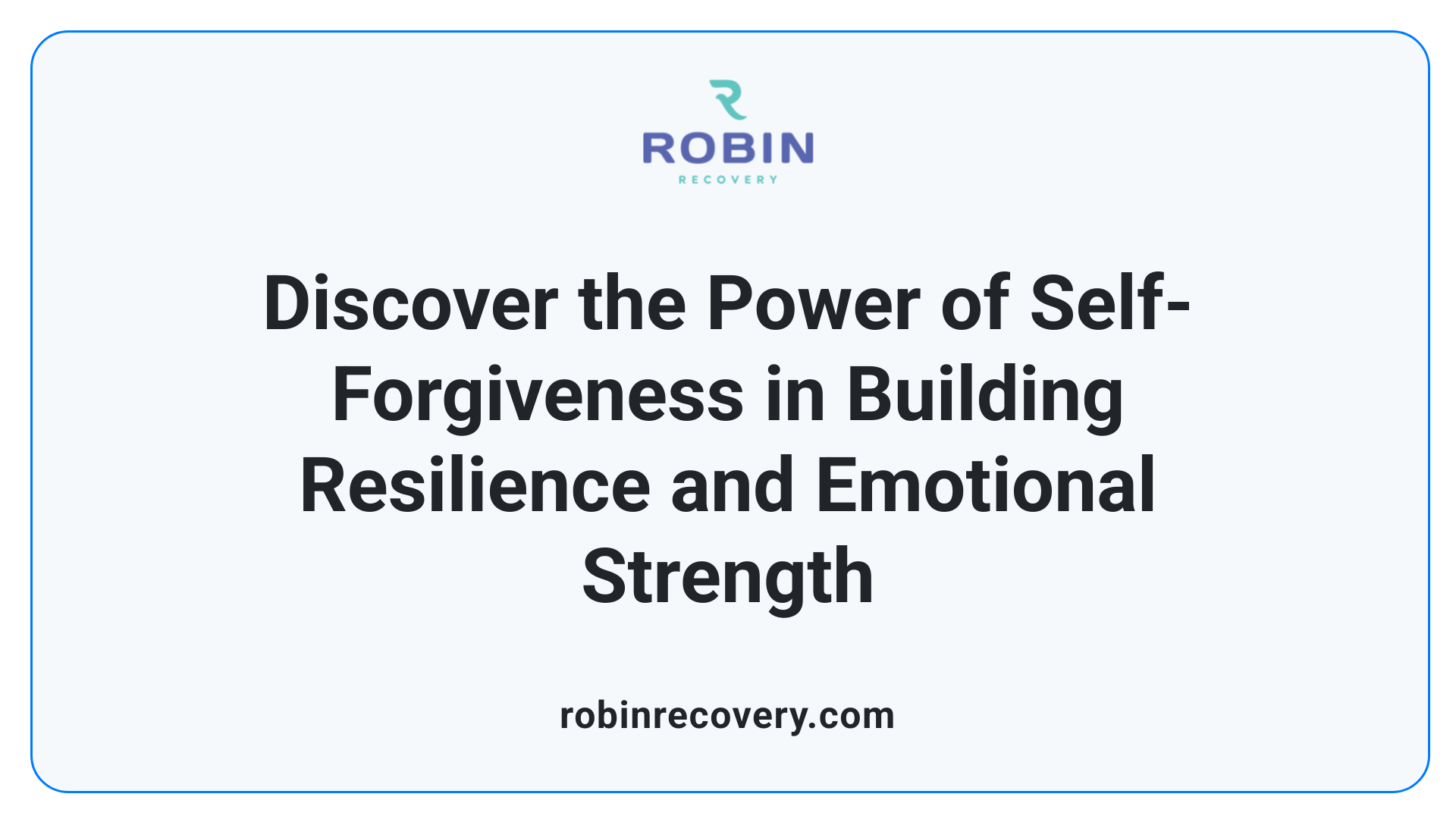
Why is self-forgiveness important in addiction recovery?
Self-forgiveness plays a crucial role in the journey of recovery from addiction. It helps individuals let go of the intense guilt and shame often associated with their past behaviors. These feelings, if left unaddressed, can hinder progress, increase stress, and even trigger relapse.
Practicing self-forgiveness involves recognizing mistakes without condemning oneself. This process transforms negative emotions into opportunities for growth, allowing one to acknowledge past actions while focusing on positive change.
The four-step approach—Responsibility, Remorse, Restoration, and Renewal—provides a structured path through self-forgiveness. Taking responsibility means honestly acknowledging past errors. Experiencing remorse encourages genuine understanding of how actions affected oneself and others.
Restoration involves making amends and repairing damaged relationships where possible. Finally, renewal signifies embracing a new, healthier self, ready to move forward without the weight of past guilt. This process fosters resilience and emotional strength.
Building self-forgiveness directly impacts managing shame and guilt. It encourages self-compassion, which is essential for healing emotional wounds. As individuals forgive themselves, they build positive self-esteem, vital for maintaining sobriety and developing healthier habits.
In essence, self-forgiveness empowers individuals to leave behind their past and forge a hopeful, resilient path forward. It nurtures the mental and emotional well-being necessary for long-term recovery and a fulfilling, substance-free life.
Practical Steps to Incorporate Forgiveness in Recovery
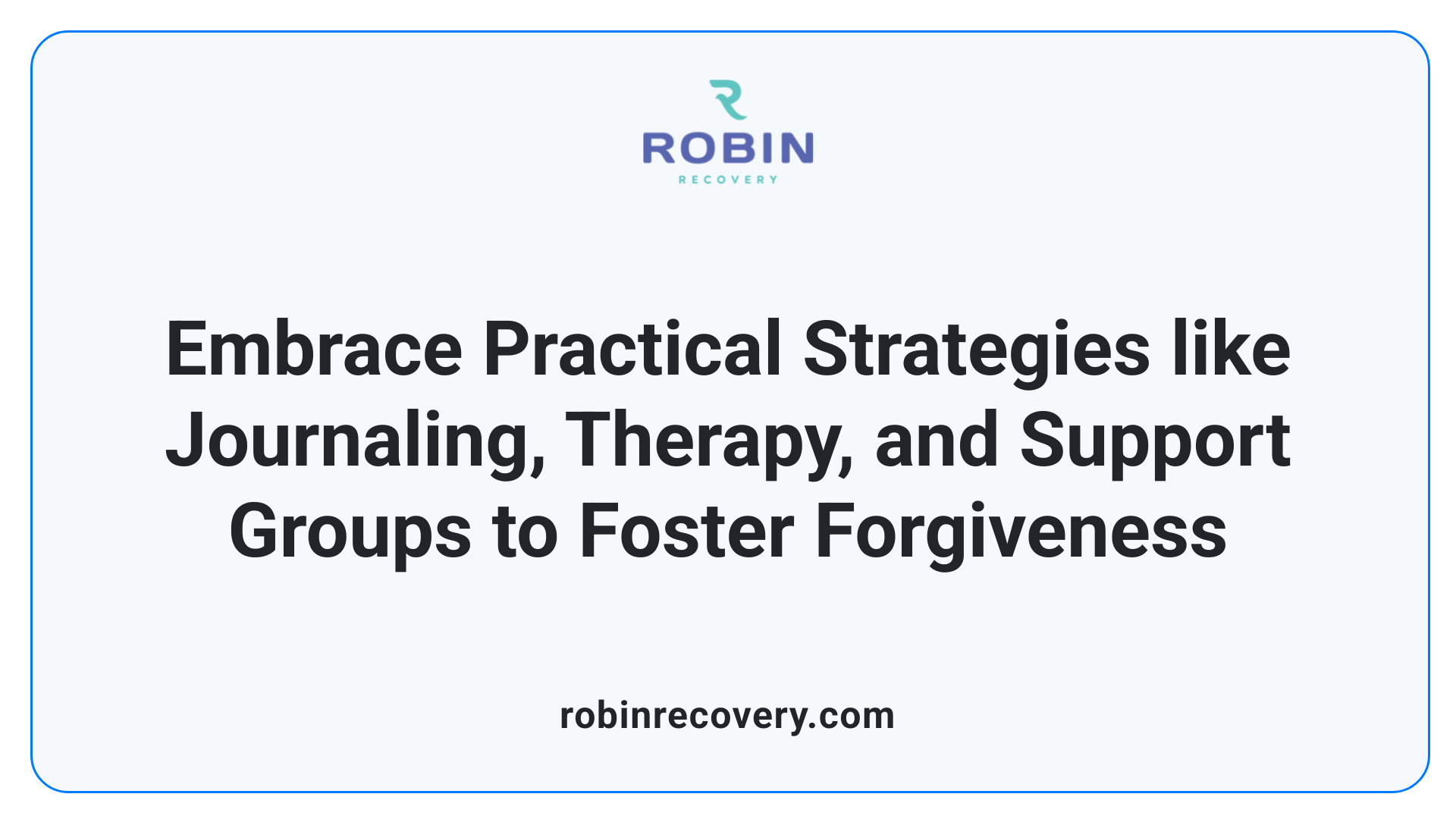
What practical strategies can help incorporate forgiveness into addiction recovery?
Integrating forgiveness into the recovery process can be transformative. Practical methods include writing unsent letters to oneself or others to express lingering emotions and facilitate closure. Journaling feelings and experiences helps clarify thoughts, acknowledge pain, and identify pathways towards forgiveness.
Engaging in therapy sessions that focus explicitly on forgiveness is also highly beneficial. These therapeutic approaches can involve cognitive-behavioral techniques, forgiveness exercises, and guided discussions that help challenge negative thoughts and foster self-acceptance.
Practicing mindfulness and self-compassion exercises creates a compassionate attitude towards oneself. Meditation, deep breathing, and loving-kindness practices can cultivate patience, understanding, and kindness—essential components of forgiveness.
Participation in support groups offers a sense of community and shared experience, encouraging individuals to share struggles and successes in forgiving others and themselves. Making amends—whether through apologies or actions—helps repair relationships damaged by addiction, bringing emotional relief.
Allowing oneself to grieve unresolved emotional pain is crucial. Working through feelings in a safe environment enables emotional release and lays groundwork for forgiveness.
To sum up, incorporating forgiveness involves a combination of writing, therapy, mindfulness, community support, and emotional processing. These strategies collectively promote resilience, emotional healing, and support sustained recovery.
Strategy Description Benefits Writing unsent letters and journaling Expressing feelings to gain clarity and closure Reduces emotional burden, fosters understanding Therapy focused on forgiveness Guided sessions to challenge harmful thoughts Facilitates self-acceptance and emotional release Mindfulness and self-compassion Meditative practices promoting kindness Increases patience, reduces self-criticism Support groups and making amends Shared experiences and relationship repair Builds community, repairs damaged ties Allowing oneself to grieve Processing emotional pain safely Loosens emotional knots, prepares heart for forgiveness
Overall, embracing these approaches can significantly aid individuals in their journey towards forgiveness and healing during recovery.
Forgiveness as a Foundation for Relationship Repair and Relapse Prevention
What are the effects of forgiveness on relapse prevention and relationship repair in recovery?
Forgiveness plays a crucial role in supporting relapse prevention and repairing relationships in recovery. When individuals practice forgiveness, they foster emotional resilience by releasing negative feelings like resentment, anger, and guilt that may act as triggers for relapse.
Healing emotionally through forgiveness also promotes openness and honesty. This enhances communication with loved ones, helping to rebuild trust that might have been damaged during active addiction.
Both self-forgiveness and forgiving others contribute to a healthier mindset. They reduce emotional burdens, such as bitterness, which can otherwise lead to stress and cravings. Less emotional pain means fewer triggers, making it easier to stay committed to sobriety.
Furthermore, forgiving others encourages empathy and understanding. This strengthens interpersonal bonds and creates a supportive environment conducive to sustained recovery.
Research indicates that forgiveness not only alleviates emotional distress but also boosts physical health, leading to better sleep, lower blood pressure, and improved immune function. These health benefits support long-term recovery efforts.
Incorporating forgiveness into recovery routines—through making amends, seeking forgiveness, or practicing self-compassion—can deepen spiritual growth and foster an inner sense of peace. This sense of purpose and acceptance helps individuals navigate challenges confidently.
Overall, forgiveness acts as a stabilizer in recovery by reducing emotional vulnerabilities and promoting healthier, more trusting relationships. It lays a solid foundation for lasting sobriety and emotional well-being.
How can rebuilding trust through making amends and seeking forgiveness from others help in recovery?
Making amends and actively seeking forgiveness are practical steps that repair damaged relationships, helping individuals reconnect with loved ones and rebuild trust. These actions demonstrate remorse and responsibility, creating space for healing and mutual understanding.
When individuals openly acknowledge past mistakes and apologize sincerely, they facilitate emotional closure for themselves and others. This can strengthen bonds and foster renewed support networks vital for sustaining sobriety.
Seeking forgiveness, whether through direct conversations or written expressions, helps in reducing lingering resentment and pain within relationships. Over time, these efforts promote a supportive environment where individuals feel accepted and valued.
In what ways does empathy and understanding strengthen relationships during recovery?
Empathy and understanding are essential in nurturing relationships during recovery. Recognizing the struggles others face and responding with compassion fosters trust and connection.
Practicing empathy allows individuals to see beyond behaviors and understand the underlying emotional pain. This perspective encourages patience and tolerance, smoothing relationships strained by past conflicts.
Enhanced understanding leads to better communication and less defensiveness, creating a safe space for sharing feelings and concerns. It also diminishes misunderstandings that could otherwise lead to relapse or relationship breakdown.
How does reducing emotional burdens like resentment and bitterness support recovery?
Holding onto resentment and bitterness increases stress and emotional instability, which can trigger cravings or relapse. Letting go of these negative feelings alleviates emotional burdens, leading to greater mental clarity.
When individuals release resentment, they free themselves from the hold of past pain, opening space for healing and positivity. This process enhances self-compassion and fosters a sense of inner peace.
Reducing emotional burdens also decreases internal conflict and provides resilience against external stressors. As a result, individuals are better equipped to cope with challenges and stay committed to recovery.
Aspect Effect in Recovery Additional Notes Relationship Repair Rebuilding trust and connection Making amends and forgiving strengthen bonds Emotional Well-being Reduced stress and emotional triggers Improving mental health supports sobriety Physical Health Decreased physical stress markers Lower blood pressure, better sleep Spiritual Growth Inner peace and purpose Enhances motivation and self-worth
Forgiveness and Long-term Sobriety: Sustaining Emotional Well-Being
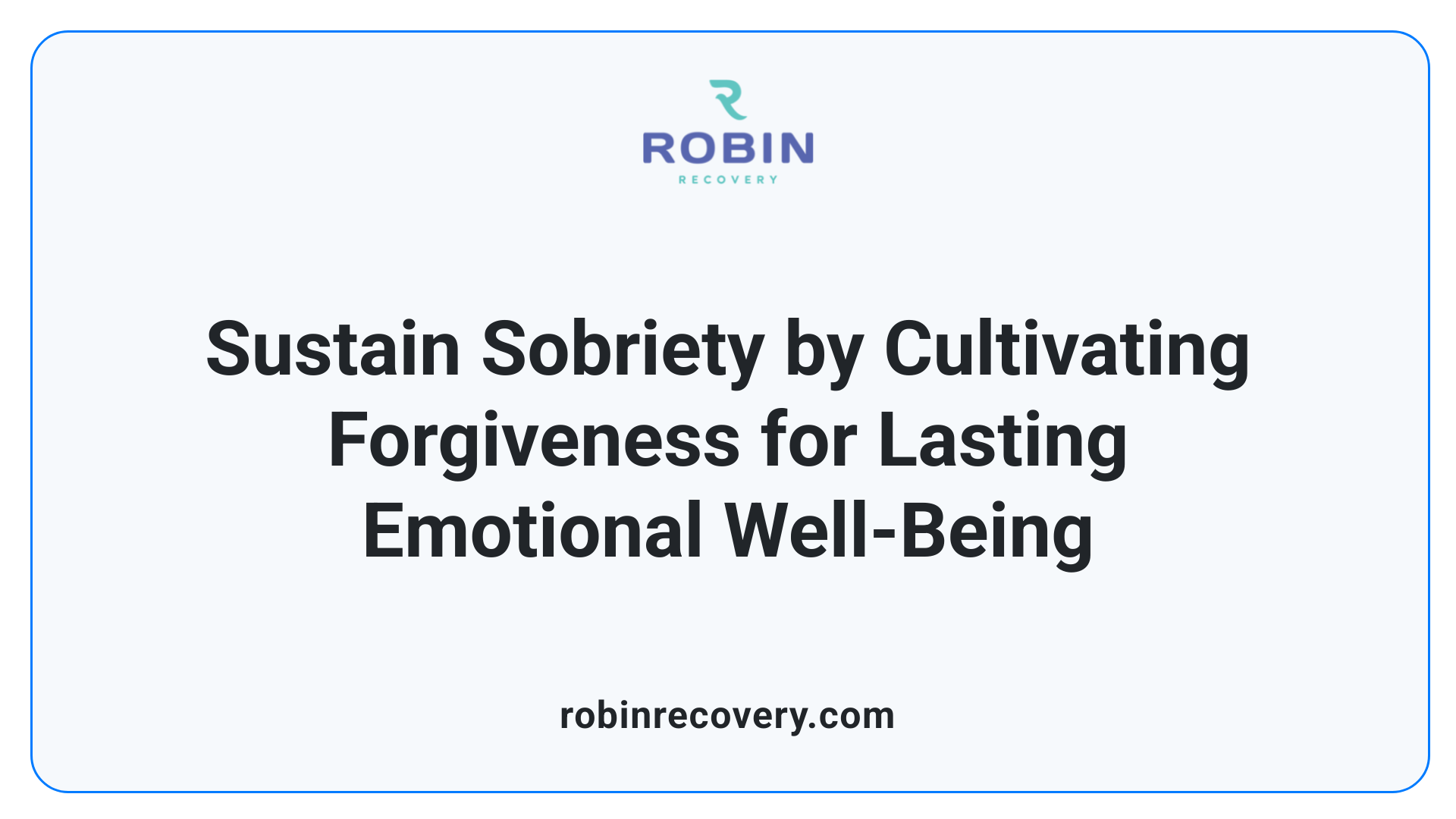
How does forgiveness support long-term sobriety and emotional well-being?
Forgiveness is a cornerstone of lasting recovery from addiction, playing a crucial role in maintaining emotional balance over time. It helps individuals release negative feelings such as guilt, shame, resentment, and anger—emotions that can trap them in cycles of self-blame and relapse.
When someone practices forgiveness, they can reduce emotional distress and physical stress responses, such as high cortisol levels and increased blood pressure. This emotional relief not only improves mental health but also supports physical well-being, creating a resilient foundation for long-term sobriety.
Self-compassion and acceptance are cultivated through forgiveness, enabling individuals to accept their past mistakes without condemning themselves. This acceptance fosters self-esteem and confidence, which are vital for facing daily recovery challenges.
Moreover, forgiveness often involves repairing damaged relationships and rebuilding trust within family, friends, or community networks. These relationships offer essential support, encouragement, and accountability that sustain recovery efforts.
Practicing forgiveness also decreases feelings of bitterness and anger, which, if left untreated, can lead to relapse. The act of forgiving oneself and others helps clear emotional burdens, allowing recovery to focus on positive growth rather than past pain.
Research underscores these benefits, showing that forgiveness reduces negative emotions, improves sleep quality, and lowers stress indicators—all of which are important for maintaining emotional stability. By integrating forgiveness into their recovery journey, individuals can enhance resilience, reduce relapse risks, and forge a healthier, more positive outlook, ensuring the longevity of sobriety and overall emotional wellness.
Embracing Forgiveness for a Brighter Future
In the journey of addiction recovery, forgiveness emerges as a powerful tool for healing, resilience, and growth. Whether directed inward as self-forgiveness or outward towards others, this process alleviates emotional burdens like shame, guilt, and resentment, paving the way for emotional stability and meaningful reconnection. Practical strategies such as journaling, therapy, and making amends support individuals in integrating forgiveness into their daily lives, fostering peace and trust. As research consistently shows, forgiving not only benefits mental and physical health but also fortifies the foundation for long-term sobriety. Embracing forgiveness allows individuals to move beyond past mistakes with compassion, paving the way for a healthier, more hopeful future.
References
- The Role of Forgiveness in Addiction Recovery
- The Impact of Self-Forgiveness and Forgiving Others in Recovery
- Forgiveness in Addiction Recovery | Self Forgiveness - BrightView
- The Role of Forgiveness in Addiction Recovery
- The Importance of Forgiveness in Recovery | Addiction Rehab
- How to Cultivate Forgiveness in Sobriety
- The Importance of Forgiveness - The Bridge to Recovery
- Longitudinal Relationship between Forgiveness of Self and ...
- Forgiveness in Addiction Recovery: What You Should Know
- Lack of Attention to The Importance of Forgiveness And Apologies in ...
